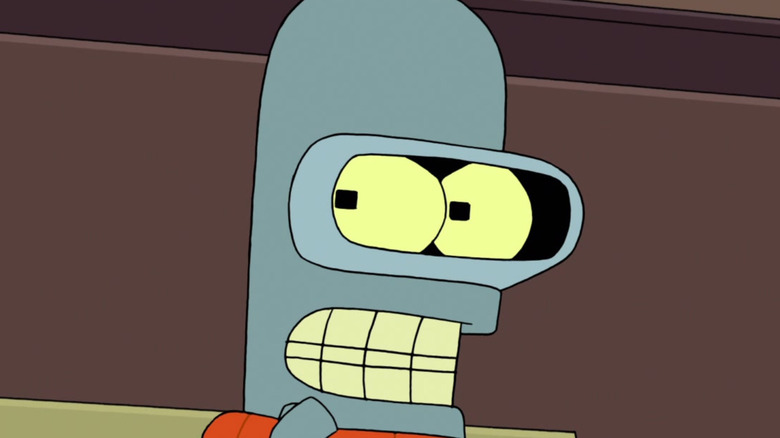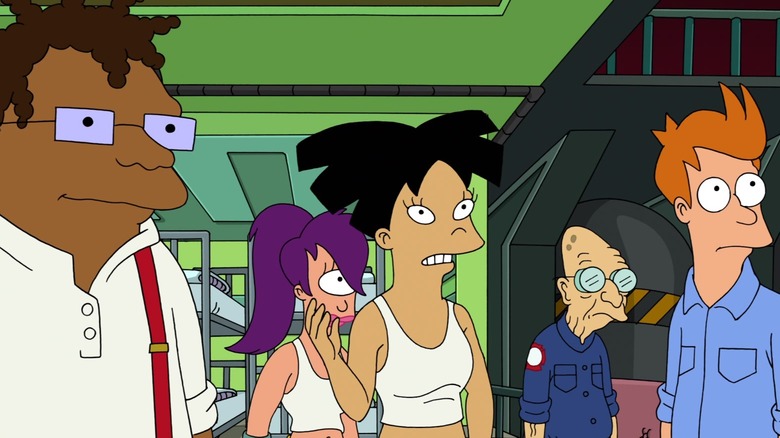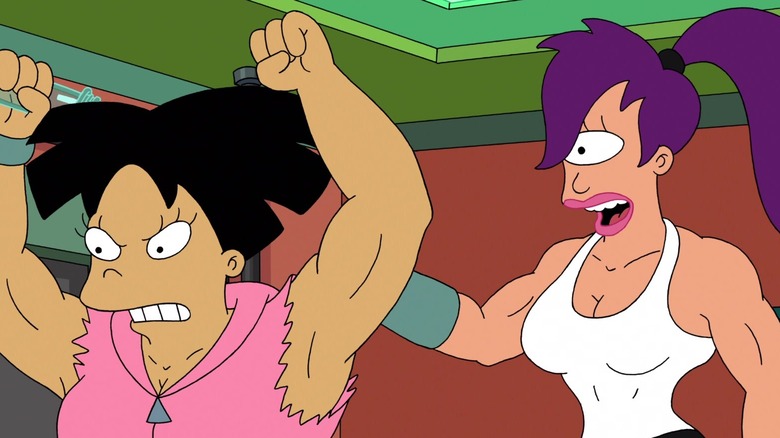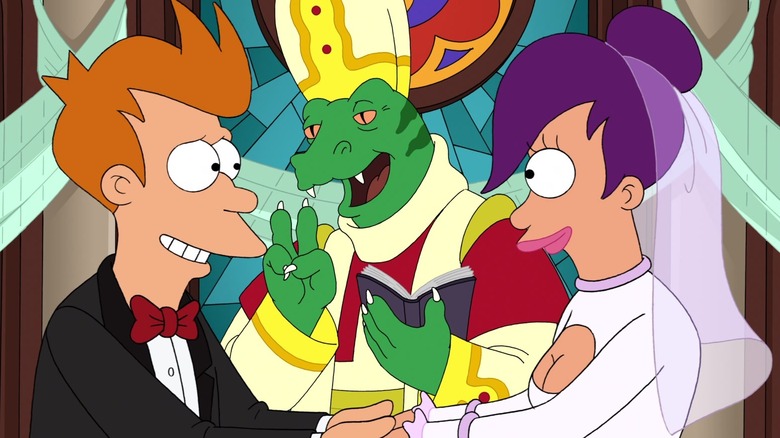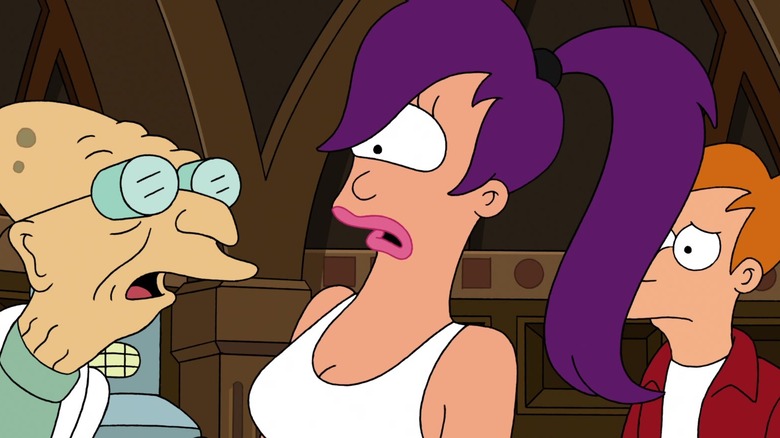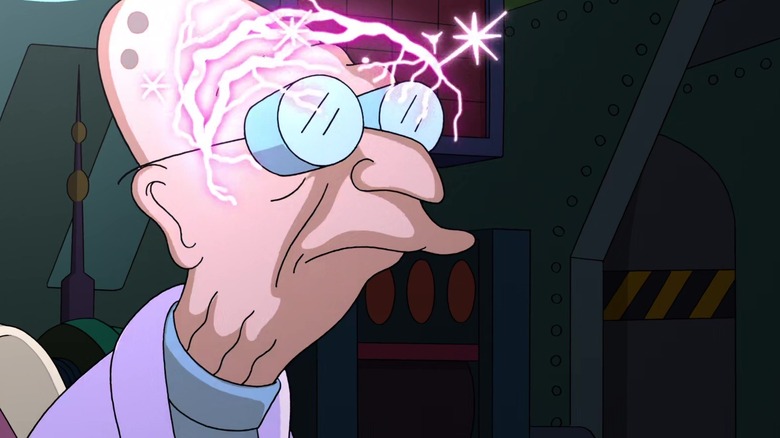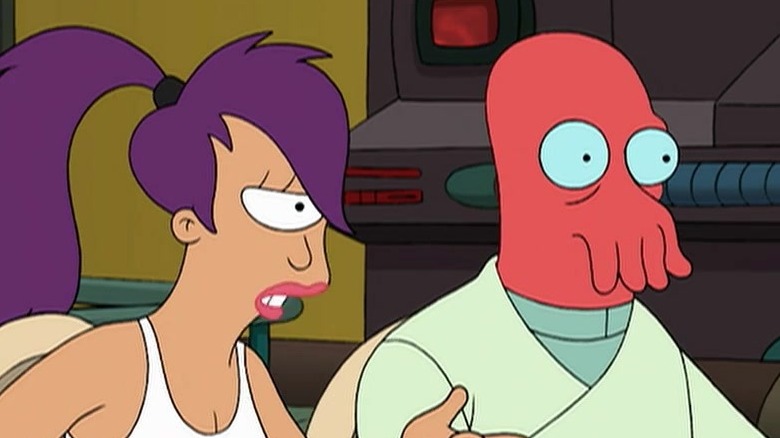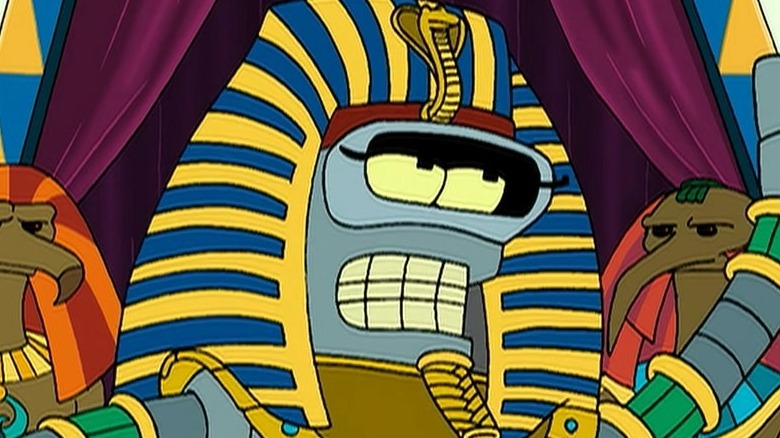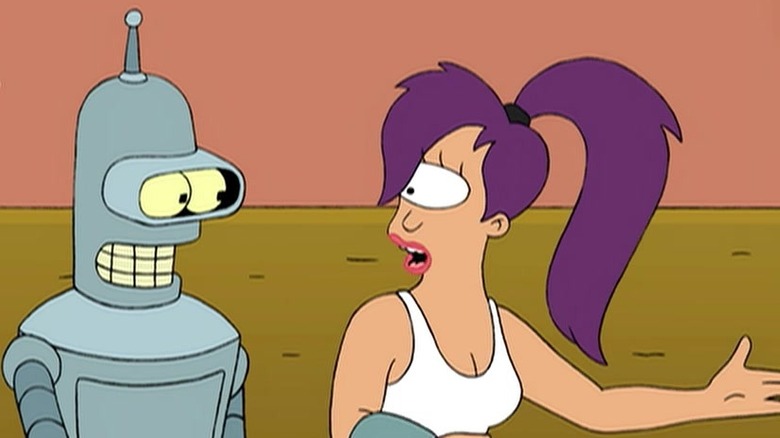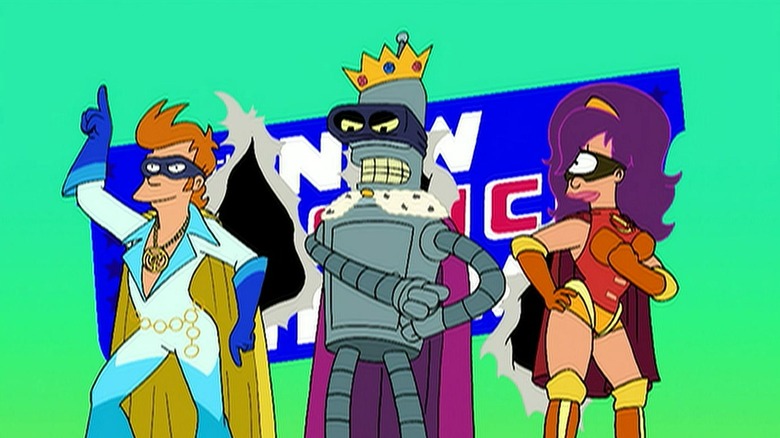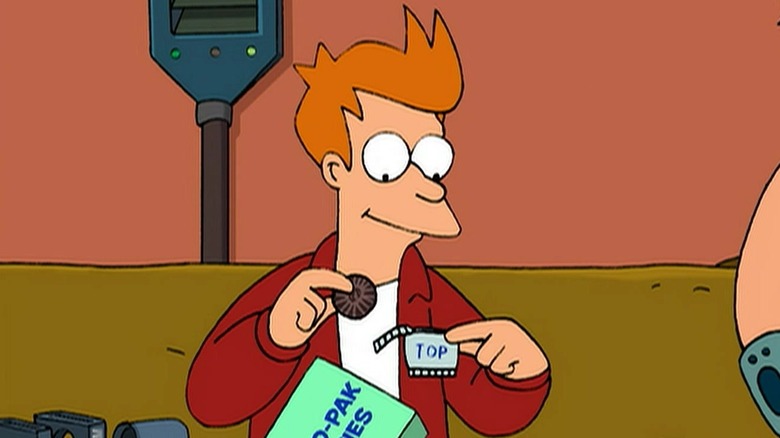Every Futurama Season Ranked Worst To Best
If ever there was a TV comeback kid, it's "Futurama." Airing sporadically from 1999 to 2013, the show battled through two cancellations — and different channels — before it was finally pronounced extinct in its 10th season. As the Old Bessie traveled across infinite planets and galaxies, Fry, Leela, Bender, and their rogue colleagues transported viewers into hilarious space-aged silliness. Known for its out-of-the-box ideas and unexpected emotional punches, the show has never taken audiences where they think they're going.
Even for the most hardened of fans, "Futurama" can be a confusing show to keep up with. With some stretches originally released as feature-length films on DVD, the program is known for having both 7 (production) and 10 (broadcast) seasons, depending on how you look at them. It's even more baffling to realize that the show was canceled twice — once after Season 5 and again in 2013. Still, "Futurama" has retained iconic staying power, and it's not done yet. Ready to go back to the future? Here's our ranking of every "Futurama" season from worst to best.
10. Season 9
When a hit show is on the way out, viewers tend to notice. It's difficult for any TV program to keep things fresh and inspired long-term, and Season 9 of "Futurama" is anything but. Its problem? A lack of authentic or original action. With no standout episodes to its name, this dip in quality is something every viewer has already seen before. Bender's attempts to flee a robotic hunt in "31st Century Fox" feel stuck in the mud, while Leela's mom dating Zapp in "Zapp Dingbat" has wasted potential. For a show that tries to depict the future humorously, Season 9 feels incredibly stuck in the past.
That's not to say some episodes don't feel inspired. The reimagining of our favorite crew members as animals in a nature documentary holds attention for long enough in "Naturama." Bender's quest to find the true meaning of life in "Free Will Hunting" is a fun bit of "Futurama" character development, if nothing else. If you look hard enough for the good moments, they're there. Yet at the same time, this season feels skippable. There's certainly a steady feeling to Season 9 — only it's steadily average.
9. Season 8
Remember that one weird episode where every character swapped genders? We don't want to either. Unlike Season 9's blandness, "Futurama" Season 8 makes sporadically creative choices that just don't work. Even though the gender-bending episode "Neutopia" knows it's bizarre, it doesn't make watching it any more enjoyable. "Cold Warriors" feels like an outdated skit from "The Simpsons," while the grotesque monster from "Fry Am The Egg Man" should be gripping, but puts in little effort. There's a heavy leaning on historical drama in Season 8 — the most apparent indication that "Futurama" was stuck in a rut.
Surprisingly, there's also a small light at the end of the tunnel. Though Season 8 is a chore to work through, there's a solid payoff in the form of "Reincarnation." No animated series can go wrong by switching its artistic style up once in a while, and this episode sees Old Bessie's crew reimagined in three distinctive sketches. Not a bad anthology take for the show's first hint at losing its steam.
8. Season 10
Going out with a bang is a good rule of thumb for any TV show to follow. After a dreary run with in Season 9, "Futurama" Season 10 tried its best to course-correct the previous damage. It's a smart move to hone in on Fry and Leela's relationship, from a romantic vacation in "Fry and Leela's Big Fling" to growing old and gray together in "Meanwhile." While the Old Bessie had a rocky outing in the previous two seasons, seeing a happy-ever-after for our favorite odd couple fills a missing piece of satisfaction. There's some "Mad Men" style suspense as Fry freefalls from a skyscraper, combined with the fine-tuned Disney formula for saving the universe. As final episodes go, "Futurama" pretty much hits the nail on the head.
Even though the ending packs in some heart, however, the rest of Season 10 has a familiar sketchy side. In an effort to pull out all the stops, episodes are zany and wild in their execution, or they simply emulate better stories, like in the sci-fi hodgepodge episode "Game of Tones." Despite the creators clearly knowing that their time was drawing to a close, this method of madness doesn't always feel like the best plan of action.
7. Season 6
Down but not out, Season 6 of "Futurama" is the product of the show's shift from Fox to Comedy Central. The season consists of 16 episodes, but it originated as four direct-to-video movies released between 2007 and 2009. Each film is broken up into four episodes for the TV version, which gives the whole season a different feel from what came before. As a result, binging can be a bit clunky and disjointed. No "Futurama" episode has ever been straightforward, but Season 6 is a completely different beast, and it's not all good.
There's still some real fun to be had in the show's action, though. "Bender's Big Score" reveals that the key to time travel is tattooed on Fry's backside, bringing back the classic silly sense of humor "Futurama" has always been loved for. While the following seasons struggled to capture the program's heart, Season 6 puts its character relationships at the forefront — even if that does mean Leela marrying a creepy-looking Lars in "Bender's Big Score: Part 3." It might not be exactly what viewers were hoping for out of a revival, but "Futurama" Season 6 is an enjoyable watch nonetheless.
6. Season 7
You'd be forgiven for not keeping up with the many cancelations and revivals of "Futurama," but Season 7 prompted another kind of new beginning. As the first fully-formed season after the hybrid nature of Season 6, the program started anew with its action. The opening episode "Rebirth" begins with a very literal focus on the show's re-appearance, with the fan-favorite hypnotoad poised to draw audiences back in. Things get risqué between Leela and Zapp in "In-a-Gadda-Da-Leela," while aliens and a mid-life crisis meet in the middle in "Lrreconciable Ndndifferences." Bender also injects some new details into his backstory, with the episode "Lethal Inspection" revealing that he was made in a factory in Mexico.
The show's writing feels smart and focused here, proving why it deserved to be revived in the first place. "Futurama" also manages to stay true to its classic tone, with episodes such as "The Late Phillip J. Fry" and "The Prisoner of Benda" dishing out old-school laughs by the bucketload. Season 7 is also a great example of older ideas done well, with "A Clockwork Origin" being a fresh take on the spin-offs fans had seen before.
5. Season 1
Bursting onto screens while movies like "The Matrix" and "The Sixth Sense" were changing sci-fi forever, it only makes sense that Season 1 of "Futurama" is still well-loved today. Riding high off of his success with "The Simpsons," creator Matt Groening had a lot to live up to. Thankfully, Season 1 of "Futurama" came out full of confidence and new ideas. The opening episode, "Space Pilot 3000," is a sassy yet endearing entrance to the world of Old Bessie's crew, while "I, Roommate" cements Fry and Bender's bond for the rest of the show's duration. Effortlessly moving through time and space, the series' sense of worldbuilding is second to none — one of many present ingredients for a successful show.
Of course, there's always room for improvement. Though Season 1 is a strong debut, "Futurama" arguably doesn't hit its peak until a little bit later. Even so, the promise is evident from the start. The cast is dysfunctional yet likable, the humor is sharp and interesting, and the world of "Futurama" is beautifully crafted with lots of exquisite detail. Not everything is fully-fleshed out, but what the show starts out as is still incredibly special.
4. Season 4
Before the sick twists and turns of shows like "Rick and Morty," there was "Futurama" Season 4. While this season still pays close attention to familiar plotlines like Fry's affection for Leela, it also expands and experiments with some of the most creative ideas the show ever displays. The episode "Roswell That Ends Well" has been billed as an underappreciated triumph for the series, tackling a grandfather paradox that dates back to 1947. Thanks to the ease of time travel, Fry morphs into his own grandfather in an ill-fated romance. Making big moves to take even bigger risks, Season 4 is a no-holds-barred chance to see the wacky inventiveness of "Futurama" on full display.
While juicy dramatic hooks fly thick and fast, Season 4 also dedicates plenty of time to character backstories. Leela is tested with an identity crisis in "Leela's Homeworld," while "Anthology of Interest, Part II" delves deeper into the show's alternate realities. From Bender's unorthodox affairs to Amy's worldbuilding, there's great a sense of continuity throughout the season. Fill your boots with passion-built "Futurama" before it's too late.
3. Season 2
Still in the show's early years, "Futurama" Season 2 sees the show really hit its stride. It's here that "Futurama" takes the time to find its footing and craft a distinct brand of comedy all its own. Episodes including "A Flight To Remember" and "Mars University" play with TV formats that never lose, from a space-age take on "Titanic" to the low-stakes drama of college life. The season isn't only focused on parodies — though "Star Trek" and "Charlie and the Chocolate Factory" are also played with — as it also takes time to flesh out the side characters.
As Fry's head gets surgically attached to Amy's body and Zoidberg learns how to be lucky in love, the show's adoration for its core cast spreads out into the rest of "Futurama." Running with potential that's already there is what Season 2 does best, fully embracing the wacky cosmic world that Groening and crew set up in Season 1. At 20 episodes, this season is also one of the longest in the program's history — and there's not a sour note to be found.
2. Season 5
"Futurama" fans might debate whether there's anything worth watching after Season 5 because it's just that good. Even though the show faced cancellation, the ideas and passion poured into the final installment of the original run go all out. Fry's willingness to lose his hands for Leela result in ridiculous laughs in "The Devil's Hands Are Idle Playthings," while "Three Hundred Big Boys" is a masterclass in episodic structure. Season 5 flits between fine-tuning older ideas and driving forward new ones, making the case that "Futurama" was far from being finished creatively.
With so many laughs up for grabs, Season 5 also goes out on a limb to offer up some heartfelt moments. Fry's attempts to bring his fossilized dog back to life in "Jurassic Bark" will bring a tear to any pet owner's eye, and topics get tough through Kif's pregnancy in "Kif Gets Knocked Up a Notch." At the time, the show was boldly going where no show had gone before, and the results stand the test of time superbly.
1. Season 3
The creme de la creme of "Futurama" undoubtedly lies in its third season. Keen to keep viewers' heads scratching from the start, Season 3 offers up a huge range of memorable and zany moments. Fry's "Futurama" past gets brought to the forefront in "Luck of the Fryfish," which drills down into the show's lore in interesting ways. When Fry's "chosen one" complex isn't driving him to save the world, he's dating Lucy Liu in holographic robot form. Viewers might think they know what to expect from the show up until this point, but "Futurama" always stays one step ahead in Season 3.
With each of its 15 episodes offering moments of brilliance, it's clear that Season 3 figures out exactly what "Futurama" should be. Balancing off-the-wall ideas with a touch of humanity, zingers such as "Amazon Women in the Mood" and "The Day the Earth Stood Stupid" earn their place in the animated TV pantheon. A special shoutout goes to "Time Keeps on Slipping," which takes the band of lovable rogues into the fourth dimension.
